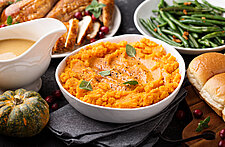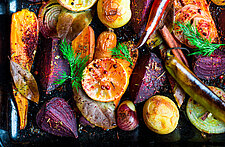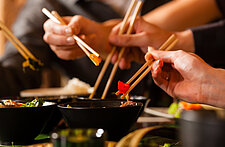A few short years ago, farm-to-table restaurants weren’t even in our vocabulary. But these days, it’s hard not to find a menu that doesn’t advertise the farmer-chef relationship, with words like “organic,” “local,” and “all-natural” strategically placed by dish descriptions.
At this year’s StarChefs International Chefs Congress (ICC), a new movement revealed itself, with sustainability the new buzzword. Although sustainability is an extension of the farm-to-table movement, it’s less likely to show up on menus and more likely to show up in the business of food. Chefs approach sustainability as a cooking philosophy—changing the way they think about food, how they work in the kitchen, and their impact on the environment. There were a few standout chefs taking the lead:
Chef Michel Bras: Respect Thy Vegetable
In 1992, Chef Michel Bras opened Michel Bras with one mission: “to create a restaurant in the middle of nature.” The legendary chef, dedicated to naturalist cooking, shared his infamous Gargouillou salad, and his love for vegetables, as the final presenter at the main stage. Earlier on, it was evident the chef has a close, intimate relationship with nature that strongly influences the way he cooks. “The understanding of a harvest grows with time. There comes a time when a man thinks about glorifying the vegetable. That is the harvest,” he said.
CLICK HERE to view the Top 14 Trends for 2016 from Starchefs ICC
Bras took guests through a typical day—“Starting early at 5 a.m. I take a walk through the garden. I am looking for the ‘it’ that will become the cuisine. I let the vegetable unveil itself.” The moment for Bras seems poetic. “I listen to the kale. I listen to the bees. And when I am cooking with a vegetable, I am almost talking with it. Cuisine is a conversation.”
As he prepped the dish, each vegetable was handled with care, as Bras instructed the audience on how each ingredient should be cut. “You have to respect the texture and color of the carrot. The technique has to be respectful. You have to listen to the vegetable and adapt the cooking technique based on its age,” he said.
Melissa Kelly: Chef Turned Farmer
Fifteen years ago, Chef Melissa Kelly got the opportunity she always wanted. In Rockland, Maine, she purchased a four-and-a-half acre farm and opened Primo, a farm-to-table restaurant sourcing ingredients from the backyard. The restaurant-farm combo is home to greenhouses, chickens, pigs, and honeybees.

The result of her team’s hard work isn’t just an award-winning restaurant, but also establishing the restaurant’s very own food chain. “We’re capturing all of the scraps. Some goes into stock, some goes into the compost. Some of it helps feed the pigs and chickens. We recycle our food waste and it comes back to us as delicious treats,” she said. But that isn’t just limited to the vegetables. “We have a ‘nose-to-tail menu.’ We use the whole pig, and treat them with much love and respect. Nothing gets thrown away.”
CLICK HERE to sign up for the weekly in-sight newsletter!
Kelly detailed the amount of planning it takes not only to keep the food chain going, but also to keep the restaurant running. “The gardeners of a daily harvest, and the harvest dictates the menu that day. But it does take a lot of planning, a lot of note taking, and a lot of seed ordering.” She also reminded guests that taking this approach also needs a bit of flexibility. “Even the best laid plans can still change with Mother Nature.”
Andrew Whitcomb: Cooking with a Conscious
Andrew Whitcomb’s cooking philosophy is all about sustainability. While the Brooklyn chef is certainly limited to how much he can grow in an urban setting, he hired a landscaping company to create a garden wall at Colonie, growing much of the herbs for the kitchen.

The rest of his menu is a result of the carefully cultivated relationship he has with tri-state area farms. On average, Whitcomb works with 85-100 farmers to source ingredients. “I try to use vegetables as much as possible. Vegetable portions are getting larger, but I’m still going to use things like bone marrow!” Vegetables crop up all over the Colonie menu, and even have a starring role. Sourdough, blood orange, olive and anchovy support radicchio. Cauliflower is a main dish served with anchovy, capers, Parmesan and croutons.
The chef also eliminated 95 percent of the restaurant waste, using pickling and fermenting methods to extending the life of fruits and vegetables. “I’m always thinking about how I can use ingredients. I’m building a pantry full of vinegars and pickled items for later use. It’s all about extending the life of that you have.”
José Andrés: Vegetables Are Sexy
The celebrity chef behind Think Food Group (Washington, D.C.) recently opened Beefsteak a veggie-focused dining establishment in D.C.’s Foggy Bottom neighborhood and plans more across the U.S. “Vegetables are as sexy as meat,” he said.
At Beefsteak, where the motto is “Vegetables Unleashed,” the fast casual eatery combines flash-prepared veggies (as farm-fresh as possible), grains, freshly-made sauces, and fresh toppings --with the option of adding meat. Andrés is quick to point the restaurant is not vegetarian, but strives to put veggies front and center, showcasing their natural deliciousness. Among the menu options: Carrot Miso Soup, BEETsteak (marinated beet, pickled red onions, sprout, chipotle, ‘Just Mayo’®, olive oil and sea salt) and a Tomato Gazpacho bowl full of romaine, scallion, tomato, cucumber sprouts, radish and extra virgin olive oil.
CLICK HERE to view complete coverage of The 10th Annual Starchefs ICC




